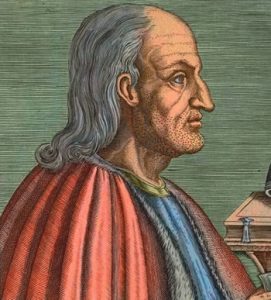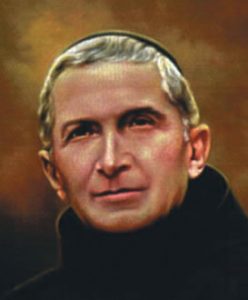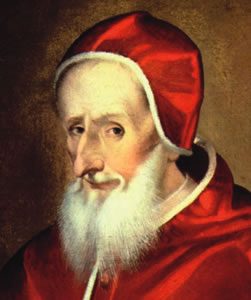April Saints
 Saint Anselm of Canterbury (c.1033-1109)
Saint Anselm of Canterbury (c.1033-1109)
Anselm was born in Aosta around 1033. He was the Abbot of Bec in Normandy in 1078 and nominated Archbishop of Canterbury by King William Rufus in 1093.
He angered William by opposing his spoliation of sees and abbeys and his extortions from the clergy; Anselm went to lay his case before the Holy See in 1097 and had to remain abroad until William’s death.
He attended the council of Bari the following year, where he resolved the theological doubts of the Italo-Greek bishops. Difficulties arose with King Henry I because Anselm refused to allow lay investiture of spiritual offices, and he had to spend a second period in exile.
Anselm was one of the first to oppose the selling of men as chattels and is regarded as the ‘father of scholasticism’. He died in 1099 and was declared a doctor of the Church without having been formally canonised.
Saint Anselm, give us the strength of faith in our life difficulties.
(Source: A New Dictionary of the Saints, Donald Attwater. 1993 Burns & Oates, Kent)
 Saint Benedict Menni (1841-1914)
Saint Benedict Menni (1841-1914)
Angelo Ercole Menni was born, the fifth of 15 children, on 11 March 1841 in the city of Milan.
God’s call to minister to the sick came early, when Angelo gave up a good position in a bank and volunteered to work as a stretcher-bearer on the battlefield at Magenta. In the Brothers of St John of God, he discovered and was attracted to the spirit of dedication and self-denial, and at age 19 he applied to enter the Hospitaller Order. He took the name Benedict, and consecrated himself to God and to the care of the sick. In 1860, he became one of the few Brothers to be ordained priest.
In those years, the Spanish branch of the Hospitallers Order died away as a consequence of some Masonic laws issued in Portugal in 1834 and Spain in 1835. Father Benedict was sent to Barcelona in 1867 to restore the Order in these countries.
Obstacles there were aplenty to put Benedict off his goal, but his iron will and determined spirit, coupled with his complete absorption into the Hospitaller spirit enabled him to overcome them all. He was able to gather many vocations and also founded 22 hospitals for every kind of sickness, especially for mental patients and handicapped children, those being the most neglected by the public health care at the time. He also founded the Congregation of the Hospitaller Sisters of the Sacred Heart of Jesus, which received the approval of the Holy See in 1901.
Throughout his religious life, Benedict Menni lived by the principles which characterise his Order: pray, work, endure, suffer, love God and silence. His influence as restorer and founder spread to the whole Order when he was appointed Apostolic Visitor (1909-1911) and subsequently Prior General (1911). He resigned the latter post a year later as a result of misunderstandings and for health reasons.
He spent the last two years of his life in humility and purification, and died on 24 April, 1914.
Saint Benedict, obtain for us compassion for the sick and suffering.
(Source: Internet – various)
 Saint Pius V, Pope (1504-1572)
Saint Pius V, Pope (1504-1572)
Born Antonio Ghislieri in Bosco, Italy, to a poor family, he laboured as a shepherd until the age of fourteen and then joined the Dominicans, being ordained in 1528. He studied at Bologna and Genoa, taught theology and philosophy and held the posts of master of novices and prior. A capable administrator, he became successively inquisitor for Como and Bergamo, commissary general of the Inquisition, Bishop of Nepi and Sutri, cardinal, grand inquisitor and, finally, Pope in 1566.
As Pope, Pius worked to implement fully the decrees of the Council of Trent. He published the Roman Catechism, Breviary and Missal, and revised the Vulgate. In 1571, Pius created the Congregation of the Index to prevent any Protestant ideas from gaining a foot hold in Italy. He organised a formidable alliance between Venice and Spain, culminating in the triumphant Battle of Lepanto.
Pius also spurred the reforms of the Church by example. He insisted upon wearing his coarse Dominican robes and was wholeheartedly devoted to the religious life. His reign was blemished only by the continuing oppression of the Inquisition; the often brutal treatment of the Jews of Rome; and the ill-conceived excommunication of Queen Elizabeth I of England in 1570. These were overshadowed by his contributions to the Catholic Reformation. He died in 1572.
Saint Pius, teach us to treasure our faith.
( Source: http://www.catholic.org/saints/saint.php?saint_id=5515)
 Entries(RSS)
Entries(RSS)